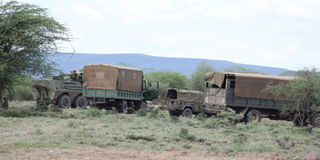It’s a miracle I’m alive, says officer after Kapedo attack

Kenya Defence Forces in Nginyang, Baringo County, conducting a security operation on November 6, 2014 to flush out bandits. Close to two thirds of Kenyans want the Government to hire more security officers and strengthen community policing to curb insecurity in the country. PHOTO | JARED NYATAYA |
What you need to know:
- Kapedo has earned the name ‘The Valley of Death’, to signify the danger of living or working in the area.
- So far, 21 firearms have been surrendered. Most of them were collected from Kabau, Naudo and Silale. Pokot elders have gone out of their way to convince morans to return guns.
A police officer who survived a bandit attack that left 19 of his colleagues dead in Kapedo last month says it is a miracle he is alive.
“I cannot even explain how I escaped. It was a horrible scene and I can only thank God I escaped death,” says Police Constable Eric Mugendi.
“For the three years I have been a police officer, I have never seen such a bloody scene. I can’t tell how I survived after those criminals sprayed our lorry with so many bullets,” he added.
“For a moment, I actually doubted if I was alive after seeing how most of my colleagues were felled by bullets as we jumped out of the lorry to seek cover. It was horrible.”
Mr Mugendi who suffered a fractured leg and hand said the bandits took advantage of the fact that their vehicle was moving slowly because of the bad terrain.
BANDITRY ATTACKS
Junior police officers told the Nation they feared for their lives. “We were deployed here not so long ago. Sometimes we run out of water and food.
This makes our job here very difficult. The situation becomes even worse with these banditry attacks that are now seemingly targeting police officers,” said an officer who sought anonymity for fear of victimisation.
At Akoret, the ground is littered with spent cartridges. This is where the 19 APs met their death on October 31 while on a mission to recover a police vehicle.
The wreckage of the car the officers were using is a stark reminder of the events of that fateful day. Inside the Land Rover are dozens of spent cartridges.
The attack shook the nation and saw President Uhuru Kenyatta travel to Kapedo to issue an ultimatum for the bandits to return the guns stolen from the slain officers.
Kapedo, on the border of Turkana and Baringo counties could easily pass as the most dangerous station for a police officer.
Residents are not having it easy either, as the ongoing military operation has made life unbearable for them, they say.
HARSH HABITAT
With rugged terrain, deep valleys and temperatures of up to 40 degrees Celcius, the environment is too harsh for habitation or work.
The deep trenches due to soil erosion have provided the bandits with hideouts from which they have been ambushing security personnel and civilians.
Kapedo has earned the name "The Valley of Death", to signify the danger of living or working in the area.
Even before the dust settled on the killing of APs, another attack at Ameyan left five people dead, among them three General Service Unit officers.
In total, 30 people have been killed in the area in the past one month.
Before the killing of the 19 officers on October 31, bandits had ambushed eight GSU officers ferrying Kenya Certificate of Secondary Education examination papers to Kapedo Mixed Day Secondary School in Turkana South.
One officer was seriously injured in the attack at Kasarani trading centre, between Lomelo and Kapedo town. The attackers later set their vehicle ablaze. It was this vehicle that the APs were going to retrieve when 19 of them were massacred.
DISARMAMENT
The police service has come under heavy criticism for sending junior officers to an area they were not conversant with. Some of them had only been in the force for only six months.
This came as details emerged that the officers made desperate calls to Nairobi for help to no avail.
The military is disarming the herders and trying to recover the stolen guns.
So far, 21 firearms have been surrendered. Most of them were collected from Kabau, Naudo and Silale. Pokot elders have gone out of their way to convince morans to return guns.
The morans, who are in hiding for fear of arrest, drop the guns at strategic points at night after which the elders collect and hand them over to authorities.




